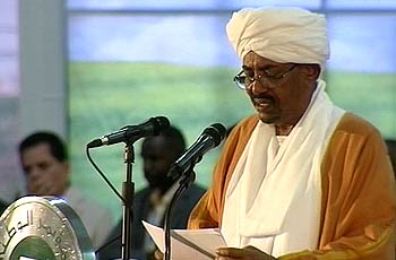Sudan’s NCP holds meeting to discuss ICC developments
December 18, 2014 (KHARTOUM) – The leadership bureau of the ruling National Congress Party (NCP) called in a meeting chaired by President Omer Hassan al-Bashir on the United Nations Security Council (UNSC) to annul resolution 1593 which referred the situation in Darfur to the International Criminal Court (ICC).

According to the NCP deputy chairman Ibrahim Ghandour, the meeting listened to a report by foreign minister Ali Karti and reiterated that the ICC is a political court and that the UNSC should adhere to standards in cancelling resolution 1593.
The ICC prosecutor Fatou Bensouda told the UNSC this month that she will freeze her office’s Darfur investigations due to lack of UNSC follow-up and stretched resources.
“Given this council’s lack of foresight on what should happen in Darfur, I am left with no choice but to hibernate investigative activities in Darfur as I shift resources to other urgent cases. It should thus be clear to this Council that unless there is a change of attitude and approach to Darfur in the near future, there shall continue to be little or nothing to report to you for the foreseeable future,” the ICC prosecutor told the UNSC last week.
“It is becoming increasingly difficult for me to appear before you and purport to be updating you when all I am doing is repeating the same things I have said over and over again,” she added.
Following the report, Bashir hailed Bensouda’s decision as a victory for his country and a sign of surrender by the ICC.
“The charges of the court was an attempt to subjugate and humiliate, but it has now lifted up its hands and surrendered,” Bashir said last week.
“The court is not a failure because the government has refused to cooperate with it, but because the Sudanese people rejected it,” he added.
But later the Sudanese foreign minister said that Bensouda’s report is an attempt to escalate the crisis in Darfur.
“This is a new technique for issuing new decisions to arrest [those] whom the court were was unable to arrest,” Karti said.
The UNSC has referred the Darfur case to the ICC under a Chapter VII resolution in 2005 since Sudan is not a state party to the court.
From the government side, the Sudanese president Omer Hassan al-Bashir, defence minister Abdel-Rahim Mohamed Hussein, former state minister for interior Ahmad Haroun and Janjaweed leader Ali Kushayb have been indicted by the ICC for war crimes and crimes against humanity allegedly committed in Darfur.
Sudan has cooperated with the court until the first arrest warrant against Kushayb and Haroun were issued in 2007.
Despite repeated non-cooperation findings referred by ICC judges to the UNSC, the council has declined to take action mainly over China’s likely move to block any resolution that would compel Sudan to cooperate.
On a separate issue, Ghandour said that the meeting affirmed that the presidential and parliamentary elections should be held next April as scheduled by the National Elections Commission (NEC).
Most opposition forces refuse holding the 2015 elections as planned and call for delaying it pending the formation of a national government during a transitional period to oversee credible elections.
Ghandour said that the meeting reviewed election preparations and ongoing national dialogue on the issue which is taking place on this issue.
(ST)
